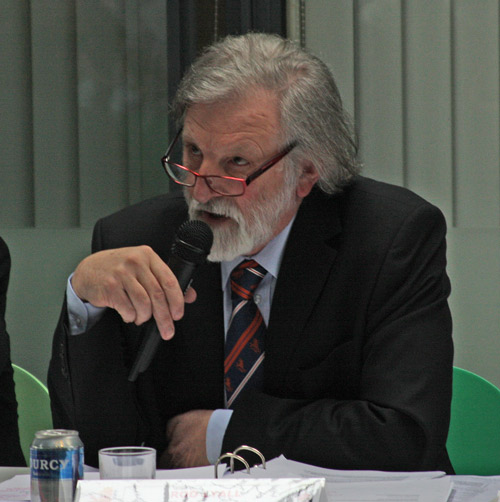 The good doctor himself has declined to be interviewed, and refuses to be drawn on his reasons for stepping down, saying only that he wishes the board every success and that he will continue to work for the benefit of Dutch cricket in other capacities. Happily it seems that we can expect his name to crop up in bylines here on CricketEurope again on occasion, but it will not be to comment on the circumstances of his departure from the KNCB.
The good doctor himself has declined to be interviewed, and refuses to be drawn on his reasons for stepping down, saying only that he wishes the board every success and that he will continue to work for the benefit of Dutch cricket in other capacities. Happily it seems that we can expect his name to crop up in bylines here on CricketEurope again on occasion, but it will not be to comment on the circumstances of his departure from the KNCB.
Said departure brings to an end some two and a half years of service as vice-chair with responsibility for youth and women's cricket, a role in which he has won plaudits from across the Dutch cricket community. One of the most active and involved of board members, regularly seen along the boundary or in the scorers' box at youth games and tournaments, and doubtless his loss will be keenly felt, if not clearly explained.
A man of strong views and little hesitation in expressing them, Lyall was always likely to be an awkward fit with the KNCB's "Polder Model" of quiet consensus, it is perhaps surprising that he lasted as long as he did. And equally surprising that he be so reticent as to his reasons for throwing in the towel. Certainly Lyall was not shy of criticising the KNCB in his previous role as Netherlands Editor for CricketEurope, but his departure last week by its timing, with all eyes on the national team's campaign across the North Sea, seems almost designed to go unnoticed.
Lyall is known to have mooted a run at the Chairmanship itself before settling for vice-chair under Jacques Mulders, but there's no hint that this resignation presages any such ambition now, nor of any personal discord in the boardroom. Indeed Lyall has privately spoken highly of Mulders' Chairmanship on several occasions. Likewise Lyall seemed enthusiastic in his role in youth and women's cricket, and positive about what has been, and remains to be achieved.
That's not to say that there are no imaginable sources of conflict in this respect - Lyall is known to have had strong opinions on several aspects of the Dutch youth system prior to his appointment, not least about potential conflicts of interest within the Lions programme as it is currently structured. But these issues are hardly new, and it's difficult to imagine that they might have prompted this sudden decision, nor that Lyall would have remained silent if they had.
The chairman himself, in deference to Lyall's own silence, likewise declined to elaborate further on the official line of a "principieel verschil van inzicht", except to say that the matter could not in good conscience be discussed publicly as it touched upon issues of employee confidentiality. This would seem to suggest that whatever prompted Lyall's resignation hinges on a personnel rather than personal question, yet given the lack of any new appointments or resignations other than Lyall's own being made public this casts little light on the matter.
Doubtless all will be revealed in due course, but in the meantime we are once again left wondering what exactly is happening behind closed doors at Nieuwegein. A cricket administrator's predilection for obscurity has rubbed off on the former vice chair during his time in office it would seem. We can only hope he shakes it off soon.